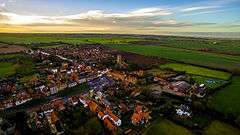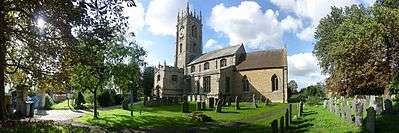Folkingham
| Folkingham | |
 Folkingham |
|
 Folkingham |
|
| Population | 729 (2001)[1] |
|---|---|
| OS grid reference | TF072332 |
| – London | 95 mi (153 km) S |
| District | South Kesteven |
| Shire county | Lincolnshire |
| Region | East Midlands |
| Country | England |
| Sovereign state | United Kingdom |
| Post town | SLEAFORD |
| Postcode district | NG34 |
| Dialling code | 01529 |
| Police | Lincolnshire |
| Fire | Lincolnshire |
| Ambulance | East Midlands |
| EU Parliament | East Midlands |
| UK Parliament | Grantham and Stamford |
|
|
Coordinates: 52°53′14″N 0°24′21″W / 52.88725°N 0.40596°W
Folkingham /ˈfɒkɪŋəm/ is a village and civil parish[2] at the northern edge of the South Kesteven district of Lincolnshire, England. It lies on the A15 road 11 miles (18 km) north of Bourne. The civil parish and ecclesiastical parish have the same boundaries. The 2001 Census recorded a population of 729,[1] increasing to 796 at the 2011 census.[3]
Village
The village has several historic buildings, such as the House of Correction and The Greyhound. The area around the castle site became a designated conservation area in 1968.[4]
Today the local economy is still mainly agriculture-based. Passing through the village are several footpaths; providing one of a number of activities that attract visitors. The New Inn is a pub/restaurant in a 17th-century building in West Street.[5] There is a tea shop and confectioner's in the Market Place.[6]
Folkingham is the home village of Major Lance Gerrard-Wright, the former equerry to the Duke of York[7] and former husband of Ulrika Jonsson.[8]
Toponomy
The place-name Folkingham seems to contain an Old English personal name, Folc(a), + ingahām (Old English), the village of the people of . . . ; the village of the people called after . . .so perhaps 'Homestead or village of Folc's or Folca's people'. [9] Folkingham appears in the Domesday survey of 1086 as Folchingeham, Folchingham and Fulchingeham.[10]
History
A castle was built in the 12th century by Gilbert de Gant, Earl of Lincoln[4] and enlarged by Henry Beaumont in the 14th century. He was given a licence to crenelate it in 1312. The last documentary record of occupation of this castle dates from 1372.[11] John Leland described it as a ruin in 1535, in which state it survived until the Civil war.[4] The site was later used as the village house of correction.[4][11][12]
In the late 18th-century Folkingham market place was used for stacking timber. Around it was a horse pond, a market cross and a small town hall. The market place was divided by chains into areas for sheep, cattle, horses and poultry, and for the sale of farm produce and other wares. In 1788 the third Richard Wynne, then lord of the manor, was in financial difficulties and sold off the estate to Sir Gilbert Heathcote, whose great-grandfather, the first baronet, was a member of Parliament, lord mayor of London and governor of the Bank of England. When Sir Gilbert acquired the estate he wanted to transform Folkingham into a small market town. His changes included clearing the market place and having it equipped to cater for the stage coaches using the main London to Lincoln road which passed through.[4]
Folkingham (then Falkingham) was the birthplace of Elizabeth Wynne Fremantle (1779–1857), the main author of The Wynne Diaries.[13]
The Falkingham Gas Light Company was founded in 1863. The installation almost certainly used a Water gas or combined Water Gas/Producer gas system to produce gas from coal. No large-scale plant was installed in the village.[14]
In 1940 RAF Folkingham, to the south-west of the village, began use as a Second World War airfield. It provided for troop carrier and airborne units and acted as a decoy airfield. During the 1950s and 1960s it was occupied by Bomber Command as a ballistic missile base.[15] It is no longer in service.[16]
Notable buildings
The House of Correction
In the early 19th century Folkingham was part of Quarter Sessions, the higher court that dispensed justice for the area, which explains why a House of Correction, or minor prison, was built. It was constructed on the site of Folkingham Castle.[11] The surviving Grade II* listed buildings consist of the original 19th-century governor's house and gateway, dating from 1808 and 1825.[17][18] It was closed in 1878 but was taken over in about 1980 by the Landmark Trust, who converted the Gateway into a holiday home.[19]
The Greyhound
The Greyhound, once a coaching inn, now an antique shop, dates back to 1650. It is a Grade II*listed building.[20]

Parish church
The Church of England parish church of Saint Andrew originates from the late 12th century and was largely completed by the late 15th, with restorations carried out in 1825, 1858 and 1860.[21] It has early Decorated Gothic arcades and a mainly Early English chancel, with a Norman pier where there was an opening into a chantry chapel. On the south side of the church are the remains of stocks and a whipping-post.[22] The church is a Grade I listed building.[21]
The church is a prominent feature of the village, but is inconspicuous from the Market Place. In 2006 it was damaged when gale force winds blew down two of the four pinnacles, one of which fell onto the roof causing damaging costing more than £100,000 to repair.[23] Folkingham parish is part of the South Lafford Group of parishes in the Lafford Deanery, Diocese of Lincoln.[24]
Folkingham Manor
Folkingham Manor House is located just off the Market place and is located in the centre of Folkingham. It was built for Lord Clinton in the 17th century and was constructed of stone taken from the castle[25]
Public transport
There is a daily express coach service to London and Hull.[26] There are one to three buses per weekday to Grantham, one per weekday to Bourne and Sleaford, and an extra Sleaford run on schooldays.[27] The nearest railway station is at Heckington (11 miles, 17.7 km).
References
- 1 2 "Census 2001". Neighbourhood Statistics. Office for National Statistics. Retrieved 8 February 2009.
- ↑ Folkingham Parish Council, Lincolnshire Parish Councils. Retrieved 31 July 2011
- ↑ "Civil Parish population 2011". Neighbourhood Statistics. Office for National Statistuics. Retrieved 17 May 2016.
- 1 2 3 4 5 Folkingham Conservation Area, South Kesteven District Council. Retrieved 31 July 2011
- ↑ Pub website Retrieved 27 November 2016.
- ↑ Trip Advisor Retrieved 27 November 2016.
- ↑ Jardine, Cassandra; "The Duchess is keeping the door open", The Telegraph, 15 October 2002. Retrieved 31 July 2011
- ↑ "Ulrika splits from her Mr Right", BBC News. Retrieved 30 July 2011
- ↑ A. D. Mills, Dictionary of English Place-Names (Oxford, 2002), p. 194; E. Ekwall, Concise Oxford Dictionary of English Place-names (Oxford, 1960), p. 183;V. Watts, Cambridge Dictionary of English Place-names (Cambridge, 2002), p. 235; K.Cameron, Dictionary of Lincolnshire Place-names (Nottingham, 1998), p. 45.
- ↑ National Archives: E31/2/2/7107
- 1 2 3 Folkingham Castle. English Heritage National Monuments Record. Retrieved 31 July 2011
- ↑ Folkingham medieval remains. English Heritage National Monuments Record. Retrieved 31 July 2011
- ↑ Wynne, Betsey; Wynne, Eugenia; editor Anne Fremantle; The Adventures of Two Sisters in Napoleonic Europe; Oxford Paperbacks (March 1982); ISBN 0-19-281304-8. The full diaries did not appear in print until 1935–40: Elizabeth Wynne: The Wynne Diaries 3 vols (Oxford: OUP).
- ↑ Gas company
- ↑ "RAF Folkingham", raf-lincolnshire.info. Retrieved 31 July 2011
- ↑ Further historical information and photographs appear on the Folkingham Past and Present site. Retrieved 27 November 2016.
- ↑ County House of Correction", English Heritage National Monuments Record. Retrieved 31 July 2011
- ↑ Historic England. "House of Correction (1360144)". National Heritage List for England. Retrieved 31 July 2011.
- ↑ "House of Correction", The Landmark Trust. Retrieved 31 July 2011
- ↑ Historic England. "Greyhound Antique Shop (1062747)". National Heritage List for England. Retrieved 31 July 2011.
- 1 2 Historic England. "Church of St Andrew (1062733)". National Heritage List for England. Retrieved 31 July 2011.
- ↑ Cox, J. Charles (1916). Lincolnshire. London: Methuen & Co. Ltd. pp. 127–128.
- ↑ "Storm-damaged church needs backing". Rutland and Stamford Mercury. Johnston Press. 2 February 2007. Retrieved 31 July 2011.
- ↑ "The Church of England in the Sleaford Area of Lincolnshire". Lafford Deanery. Retrieved 31 July 2011.
- ↑ Genuki. "Folkingham". www.genuki.org.uk. Retrieved 2016-01-17.
- ↑ Timetable, etc. Retrieved 27 November 2016.
- ↑ Times Retrieved 27 November 2016.
External links
 Media related to Folkingham at Wikimedia Commons
Media related to Folkingham at Wikimedia Commons- "Folkingham (also Falkingham)", Genuki.org.uk. Retrieved 31 July 2011
- Folkingham, homepages.which.net. Retrieved 31 July 2011
- Folkingham, Lincolnshire, astoft.co.uk. Retrieved 31 July 2011
- Folkingham Castle, everingham.com. Retrieved 31 July 2011
- "The Parliamentary Gazetteer’s Summary of Folkingham, 1843", The Bourne Archive. Retrieved 31 July 2011
- "Britain turns out the supercar", Pathe News: BRM car tested at Folkingham aerodrome. Retrieved 31 July 2011
- Folkingham village video. Retrieved 18 Dec 2010